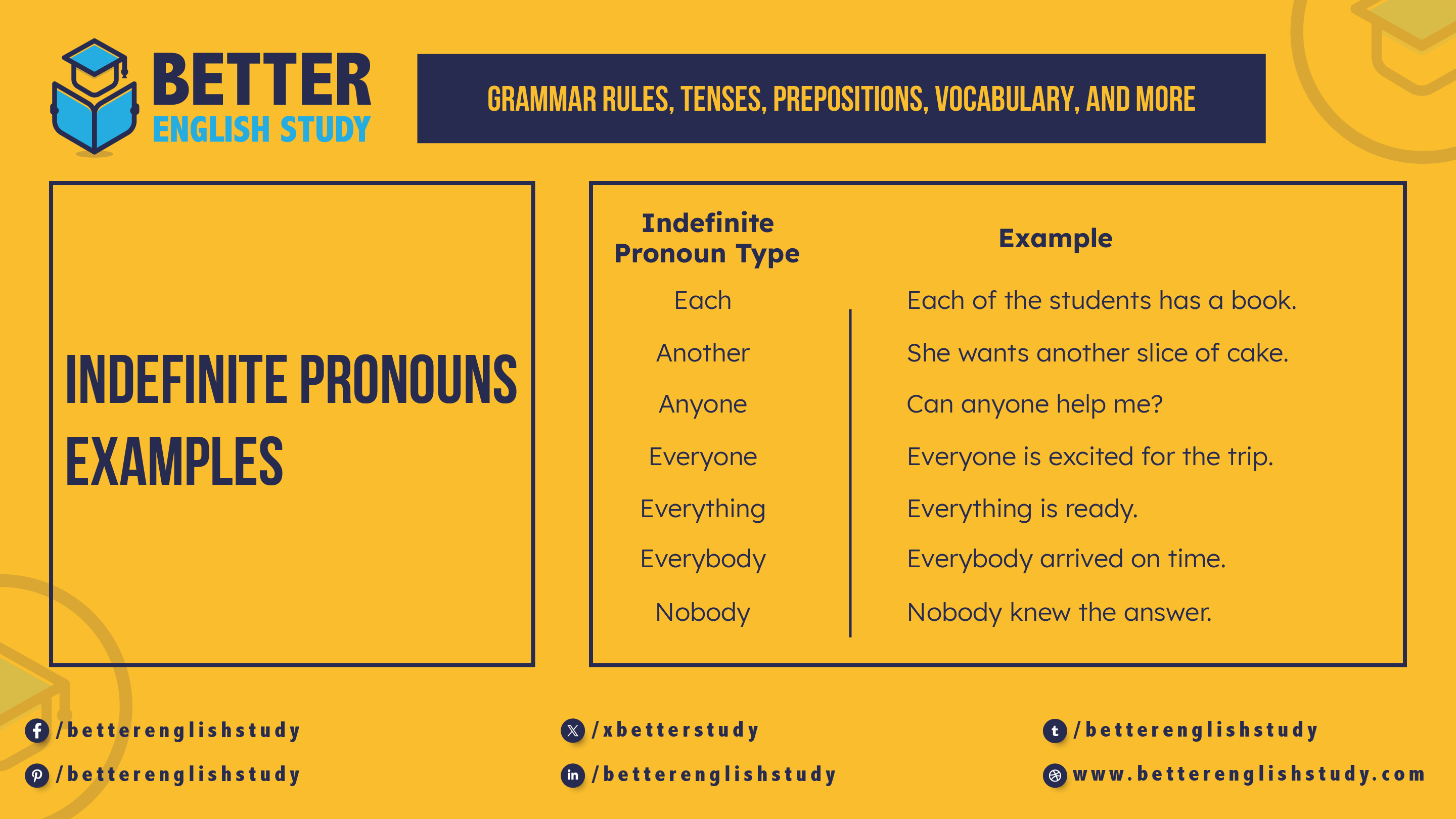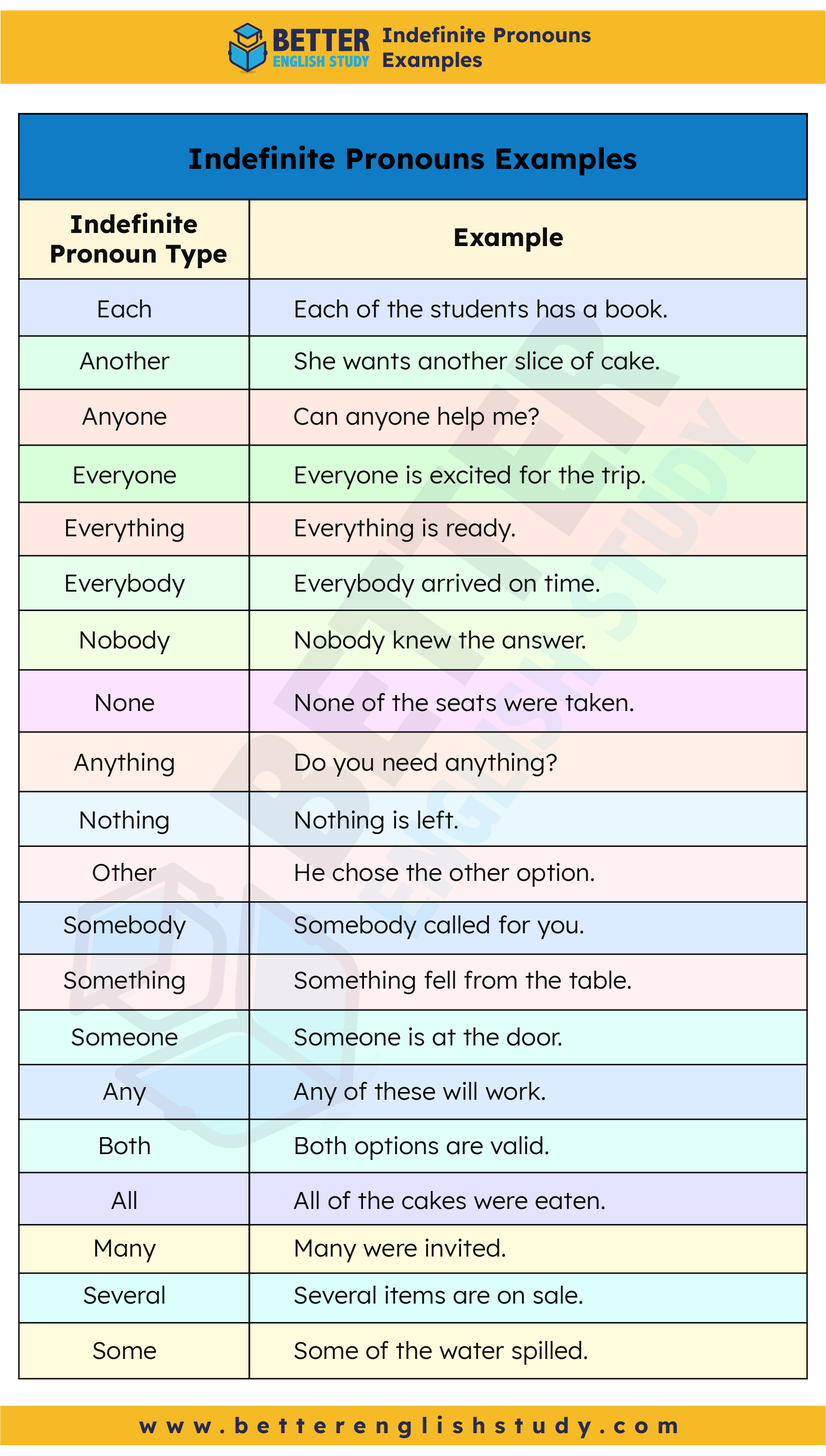
Imagine you’re at a bustling market, and someone shouts, “Everyone, listen!” Who is everyone? The crowd is vast, and the person isn’t pointing out anyone specifically. This is a great example of how indefinite pronouns work in English – they refer to people or things without saying exactly who or what they are.
In this article, we’ll explore the world of indefinite pronouns and show you how they help in daily communication without needing to specify every detail.
What are Indefinite Pronouns in English?
Indefinite pronouns are words that do not refer to a specific person, place, or thing. They are useful when the identity of the noun is unknown or not important. For example, in the sentence, “Someone left their umbrella,” the word “someone” is an indefinite pronoun because it doesn’t specifically identify who left the umbrella.
Definition of Indefinite Pronouns
According to the authoritative resource Merriam-Webster, indefinite pronouns are pronouns that refer to one or more unspecified beings, objects, or places. They don’t specifically identify what they are referring to, which makes them handy in general statements or when details are unknown.
Types of Indefinite Pronouns
Indefinite pronouns can be broadly categorized into singular and plural forms, each serving a distinct purpose in sentences.
1. Singular Indefinite Pronouns
These pronouns refer to one person or thing. Examples include “each,” “another,” “anyone,” “everyone,” “everything,” “everybody,” “nobody,” “none,” “anything,” “nothing,” “somebody,” “something,” “someone,” and “any.”
2. Plural Indefinite Pronouns
These pronouns refer to multiple people or things. Examples include “both,” “all,” “many,” “several,” and “some.”
What are the Indefinite Pronouns with Examples?
1. Each
“Each” refers to every individual item in a group separately. It is singular.
- Each of the students has a unique talent.
- Each apple was polished to a shine.
- She gave each child a toy.
- Each day brings new opportunities.
- Each of the participants received a certificate.
2. Another
“Another” indicates an additional item or person. It is singular.
- She took another cookie from the jar.
- We need another chair for the guest.
- Could you bring me another pen?
- He wants to watch another movie.
- Let’s try another approach.
3. Anyone
“Anyone” refers to any person. It is singular.
- Is anyone home?
- Can anyone solve this problem?
- Anyone can join the club.
- Did anyone see my keys?
- She didn’t invite anyone to the party.

4. Everyone
“Everyone” means all people in a group. It is singular.
- Everyone enjoyed the concert.
- Everyone must submit their report by Monday.
- Did everyone understand the instructions?
- Everyone in the room was excited.
- Everyone agreed with the decision.
5. Everything
“Everything” refers to all things. It is singular.
- Everything is set for the trip.
- She packed everything she needed.
- Everything went smoothly at the event.
- He gave everything he had to the cause.
- Everything in the shop was on sale.
6. Everybody
“Everybody” means all people in a group. It is singular.
- Everybody loves a good story.
- She greeted everybody at the party.
- Is everybody ready to go?
- Everybody needs a friend.
- He thanked everybody for their help.
7. Nobody
“Nobody” means no person. It is singular.
- Nobody knew the answer.
- Nobody was at home.
- She invited nobody to her house.
- Nobody saw him leave.
- Nobody can beat his record.
8. None
“None” means not one or not any. It can be singular or plural, depending on the context.
- None of the options are suitable.
- None of the milk was spilled.
- None could believe their eyes.
- He liked none of the movies.
- None were left behind.
9. Anything
“Anything” means any object, event, or matter. It is singular.
- Do you need anything?
- She didn’t say anything.
- Is there anything I can do?
- He will do anything for his family.
- Anything is possible with hard work.
10. Nothing
“Nothing” means no single thing. It is singular.
- Nothing was broken.
- He said nothing during the meeting.
- She left nothing to chance.
- Nothing can stop us now.
- There is nothing to worry about.
11. Other
“Other” refers to a different item or person. It can be singular or plural.
- She prefers the other dress.
- There are no other options.
- He chose the other path.
- The other students are waiting.
- She wanted to try other recipes.
12. Somebody
“Somebody” means some person. It is singular.
- Somebody left their phone here.
- She needs somebody to talk to.
- Can somebody help me?
- Somebody knocked on the door.
- He knows somebody at the company.
13. Something
“Something” means some unspecified thing. It is singular.
- Something is wrong with the car.
- She found something interesting.
- Do you want something to eat?
- There is something I need to tell you.
- He heard something strange outside.
14. Someone
“Someone” means some person. It is singular.
- Someone is at the door.
- Can someone explain this to me?
- She needs someone she can trust.
- Someone left their bag here.
- He is waiting for someone special.
15. Any
“Any” can refer to one, some, or all without being specific. It can be singular or plural.
- Do you have any questions?
- Any of these books will be useful.
- Is there any milk left?
- You can take any seat.
- I don’t have any money.
16. Both
“Both” refers to two people or things. It is plural.
- Both of them are coming to the party.
- She likes both apples and oranges.
- Both options are good.
- He invited both his friends.
- They both agreed on the plan.
17. All
“All” means every person or thing in a group. It can be singular or plural, depending on the context.
- All of the students passed the exam.
- She spent all her money.
- All is well that ends well.
- He ate all the cookies.
- All were happy with the results.
18. Many
“Many” means a large number of people or things. It is plural.
- Many students participated in the event.
- She has many friends.
- There are many books to choose from.
- He made many mistakes.
- Many were invited to the party.
19. Several
“Several” means more than two but not many. It is plural.
- She visited several countries last year.
- He has several ideas for the project.
- Several students were absent.
- They saw several birds in the park.
- Several were interested in the offer.
20. Some
“Some” means an unspecified amount or number. It can be singular or plural, depending on the context.
- She made some cookies for us.
- Some of the students are missing.
- He needs some help with his homework.
- Some of the milk was spilled.
- Some were not interested in the proposal.
Summary Table of Indefinite Pronouns Examples
| Indefinite Pronoun Type | Examples |
| Each | Each of the students has a book. |
| Another | She wants another slice of cake. |
| Anyone | Can anyone help me? |
| Everyone | Everyone is excited for the trip. |
| Everything | Everything is ready. |
| Everybody | Everybody arrived on time. |
| Nobody | Nobody knew the answer. |
| None | None of the seats were taken. |
| Anything | Do you need anything? |
| Nothing | Nothing is left. |
| Other | He chose the other option. |
| Somebody | Somebody called for you. |
| Something | Something fell from the table. |
| Someone | Someone is at the door. |
| Any | Any of these will work. |
| Both | Both options are valid. |
| All | All of the cakes were eaten. |
| Many | Many were invited. |
| Several | Several items are on sale. |
| Some | Some of the water spilled. |
By understanding and using indefinite pronouns correctly, you can make your communication clearer and more versatile. They allow you to refer to people or things without saying exactly who or what they are, making your speech and writing more fluid and natural. So next time you find yourself needing to talk about something or someone without specifics, you’ll know just the pronoun to use!
